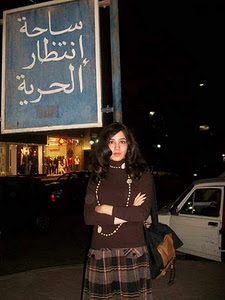
Aliaa Mahdy
by Joseph Mayton, bikyamasr, December 6, 2011
Egypt’s revolution has stalled. Islamists have taken the lion’s share of the first round of voting. In Tunisia and Morocco, large gains by the Islamists have seen women begin to question their future in conservative societies. Aliaa Mahdy changed the global perspective on how women are viewed in the Arab world, when she posted in November a full-frontal nude photo of herself on her blog.
The posting of her naked body left Egyptians and Arabs angry. Hate and condemnation quickly followed. Ironically, despite all the hatred purported in her direction, millions of people logged onto her blog to see her picture, with even lewd comments being posted.
For Mahdy, it was a symbolic protest against the status of women in Egypt and across the Arab world. She said enough to the centuries of male-domination meted out to women in the country and the region. It was the beginning of the Islamic world’s “Nude Spring†and launched a debate over women’s rights, or rather, “what is appropriate for women.â€
In Tunisia, Nadia Bostah was attacked after she posed semi-nude for a magazine cover and then re-published the image on her Facebook page. Anger was quick to follow. In Pakistan, popular actress Veena Malik was criticized for posing nude for India FHM – although no “parts†were showing.
The Nude Spring in the Islamic world highlights the struggle women have in the region. The anger towards Mahdy, which resulted in at least one case being brought against her, in which the lawsuit claims she was “trying to spread her obscene ideology through the nude pictures.â€
The Coalition of Islamic law graduates coordinator Ahmed Yehia told Bikyamasr.com that “it is an insult to the revolution as these two persons who pretend to be one of the revolutionists and asking for sexual freedoms, they are giving the uprising a bad name.â€
“It is our duty to fight corruption and this is a corruption case, we people who are trying to corrupt society with foregion and unacceptable customs like the sexual freedom they ask for,†continued Yehia.
What is corrupting about a blogger posting her nude body on her blog? In today’s Internet Age, there are nake pictures across the web, most more graphic than the one Mahdy posted. At the end of the day we can choose to click the link or not to either view the image or avoid it.
But the point of the Nude Spring, whether intentional or not, is that women continue to face a double-edged sword.
Take for example the attacks on Egypt’s Tahrir protesters, women in specific, who were accused of “fornication†and “drug use†by the ruling military junta in the country. Women face an uphill battle, with a snowball towering toward them in Egypt and around the region. To do what they want with their bodies seems to not be their own personal decision, but the decision of the men that control their destiny.
Too often women are perceived as objects in many conservatives’ views. Things that can be owned and used for a man’s pleasure when he desires and when he wants. This is why we have seen the growth of polygamy, the shoving aside of a woman’s ability to choose her life’s goals, and the unending “debate†over the causes of sexual harassment and sexual assault.
And it was not only the conservatives who attacked Mahdy, Malik and Bostah, it was the liberals who entered the fray of condemnation.
Liberal activists online lamented that the 20-year-old university student has “ruined†her life, is “young and doesn’t know what she has done.†But in an inherently conservative society, Mahdy has created something only the truly revolutionary in today’s world can do: showing the hypocrisy of the so-called freedom fighters for expression.
So when Mahdy removed her clothes, she undressed the liberals and their calls for freedom. Obviously, in their mind, she made a mistake. She was wrong. Nudity has no place in Egypt. But for the millions of women, who on a daily basis face sexual harassment, assault and categorical oppression from all sides, she did what no activist has been able to do. She won. She told the world that her body is owned by nobody other than herself. Disagree with the tactic, fine, but one must, if they truly espouse the idea of freedom of expression, support her in her cause.
At the end of the day, one may attempt to cover a woman’s body with clothes, force them into the home, but in today’s Internet world, women like Mahdy can achieve more naked than they ever can clothed and in the streets.
We should look at the Nude Spring with optimism that women like Mahdy are not backing down to the status quo, are pushing their countries forward. These women may not have intended to create such an outpouring of criticism, but one thing is for certain: they took their bodies back from the men who have dominated society for generations and will no longer hide.